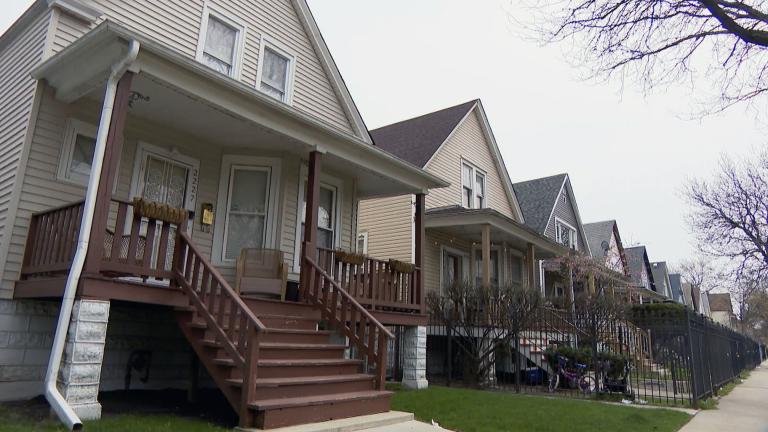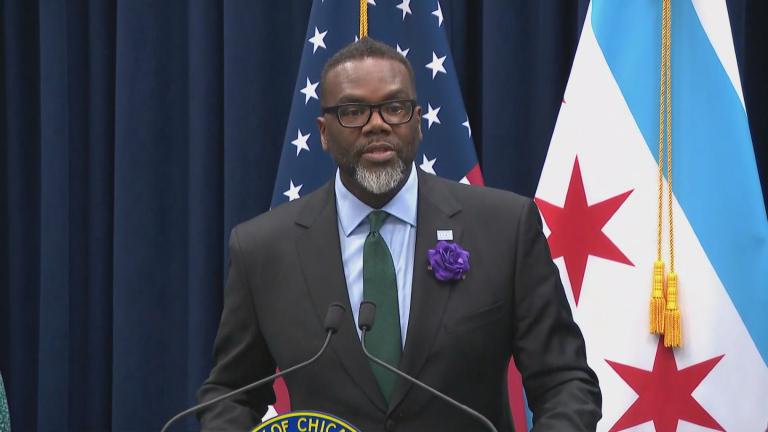Mayor Lori Lightfoot’s plan to close a projected $1.2 billion budget gap in 2021 would hike sales and property taxes by $76.4 million, eliminate 1,921 city jobs and dip into the city’s rainy-day fund.
The plan also closes a $799 million shortfall in the city’s 2020 budget caused by the economic collapse triggered by the coronavirus pandemic.
In all, Chicago property owners will see their taxes rise $93.9 million in 2021, in part because the pandemic’s toll on the city’s economy has been so profound that Chicago finance officials project that 10% of property owners won’t pay their tax bills, as first reported by WTTW News.
In a typical year, approximately 3% of property owners do not pay their taxes, according to Chicago officials.
The total proposed increase, equal to 1.3% of a property’s value, will add $56 per year to the tax bill for the owner of a home worth $250,000.
Approximately $16 million of the increase will come from property taxes on new construction, not existing homes and businesses, officials said.
Lightfoot blamed the need for a property tax increase that will not be used to fill the massive 2021 gap on an interpretation of a 2016 state law that requires the city to use property tax revenue to make the required payments to its pension funds, regardless of how many property owners fail to pay their bills.
After 2021, the city’s property tax levy will be tied to increases in the cost of living, as measured by the federal government’s consumer price index. Most government agencies follow a similar procedure, and Lightfoot said it would help avoid huge increases in the future.
“Chicago’s 2021 Budget represents our city’s roadmap toward an inclusive and fiscally responsible recovery from the extensive challenges of the unprecedented COVID-19 crisis,” Lightfoot said in a statement before her budget address.
In addition, the plan calls for Chicago’s 5-cent-per-gallon gasoline tax to rise to 8 cents per gallon, the maximum allowed under the state law passed in June 2019 that hiked the state gas tax by 19 cents to pay for infrastructure projects statewide. That will likely add 36 cents to the bill for 12 gallons of gas, according to city officials.
The gas tax hike as well as a plan to increase the lease tax on computers and servers to 9% would generate $25 million in new revenue, officials said.
The Chicago chapter of the Democratic Socialists of America — which elected six members of the City Council in 2019 — blasted Lightfoot for relying on tax increases the group said would hit Black and Latino Chicagoans hardest.
United Working Families, a quasi-political party with ties to the Chicago Teachers Union, said it was “immoral to raise property and gas taxes on poor people” while subsidizing developments like Lincoln Yards on the North Side.
On the other end of the political spectrum, Jack Lavin, the president of the Chicago Chamber of Commerce, said Lightfoot’s plan needs more work and would hurt businesses struggling to stay open after the pandemic and unrest.
“Employers and families cannot afford new taxes that will slow down business growth, which ultimately stunts hiring and impacts residents and consumers throughout Chicago” Lavin said in a statement.
Video: Part 1 of our conversation with Alds. Maria Hadden, Pat Dowell, Scott Waguespack and Anthony Beale. Watch part 2 here. (Produced by Paul Caine)
Lightfoot’s spending plan calls for 618 vacant positions to be eliminated from the Chicago Police Department. Amid calls to significantly reduce spending on police, CPD’s budget will drop by approximately 3.3% to $1.69 billion in 2021.
Lightfoot’s proposal was immediately condemned by groups that wanted to see the CPD budget cut much more significantly — criticism that Lightfoot anticipated and rebuffed with a full-throated defense of the police department, which is under the oversight of a federal judge for routinely violating the rights of Black and Latino Chicagoans.
“I do not believe that having fidelity to this essential work of bias-free policing requires dismantling our police department,” said Lightfoot, who lost her composure while recounting efforts by an officer to save a 7-year-old girl shot in the head. “So, my colleagues in the City Council, as you review this budget and appropriately scrutinize how dollars are allocated toward public safety, I urge you to look beyond the hashtags, and think about the men and women who courageously report for duty every day on our behalf, to keep us safe.”
In all, the city will save $91.3 million by cutting 1,921 vacant positions and an additional $15.3 million through a combination of layoffs and furloughs.
Approximately 350 employees will be laid off on March 1, which could allow time for Congress to pass a relief package for state and local governments after the election — or after the inauguration of a new president.
All non-union employees, including Lightfoot, will take a five-day unpaid furlough to help balance the budget, the mayor said.
“I have struggled personally with the prospect of layoffs,” Lightfoot said. “I do not relish the prospect of unemployment for any city worker.”
Chicago Federation of Labor President Bob Reiter said in a statement that the city should strengthen public services during the pandemic.
“Chicago’s unions are actively working on identifying cost savings and efficiencies we believe would at least equal the budgetary impact of workforce cuts, obviating the need for furloughs, layoffs, or vacancy reductions,” Reiter said.
Lightfoot’s plan also calls for the city to borrow an additional $1.7 billion to refinance existing city debt to save $450 million in 2020 and $501 million in 2021. The plan means that it will take the city longer than expected to pay off the debt — increasing interest costs and adding to the city’s already large debt burden, officials said.
Lightfoot also declared $304 million in the city’s Tax Increment Financing program to be in surplus, which will send $76 million back to the city’s general fund and help fill the shortfall.
Video: Aldermen react to the mayor’s proposal. Part 2 of our conversation with Alds. Maria Hadden, Pat Dowell, Scott Waguespack and Anthony Beale. Watch part 1 here. (Produced by Paul Caine)
The plan also calls for Chicago Public Schools to pick up the $14 million tab for crossing guards, and make the required $40 million pension payment toward teachers and staff members in 2021.
That will likely heighten tensions between Lightfoot and the Chicago Teachers Union, and exacerbate the school district’s budget problems, since officials had counted on an additional $343 million in federal aid that has been blocked by Senate Republicans.
A month after Chief Financial Officer Jennie Huang Bennett told members of the City Council’s Finance Committee that the city should not touch Chicago’s rainy-day fund because of the city’s uncertain financial future — and the fact that no one knows when a vaccine or treatment will end the pandemic — Lightfoot proposed using $30 million from its $900 million savings account to balance its budget. The mayor also called that “modest.”
An additional $431 million would be slashed from the city’s budget through a combination of spending cuts and “improved fiscal management.”
Lightfoot’s plan calls for $7 million in new funds to be spent on programs designed to help the city recover from the coronavirus pandemic; an additional $5.25 million to be spent on violence prevention plans; an additional $2 million on affordable housing projects and $1.7 million on programs designed to help Chicago’s teens and young adults.
As she ended her hourlong speech, Lightfoot acknowledged that her plan would face significant opposition, including from aldermen loath to run for re-election after having voted for a property tax hike to balance the budget.
“As the hearings commence and the debate ensues, please remember to be kind to each other,” Lightfoot said. “We and you may not agree on every issue, but let’s have this City Council budget season be a model for the nation on how, democracy, messy as it always is, can also be filled with efforts to build bridges to each other and continue on our path toward that more perfect union.”
Contact Heather Cherone: @HeatherCherone | (773) 569-1863 | [email protected]






